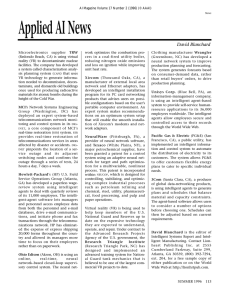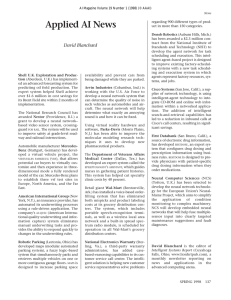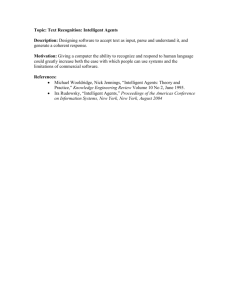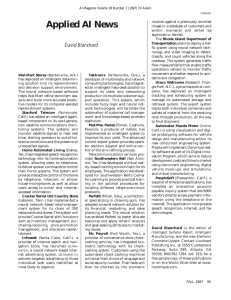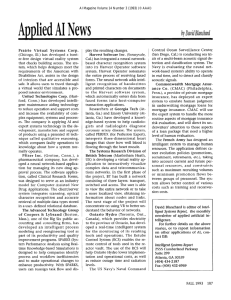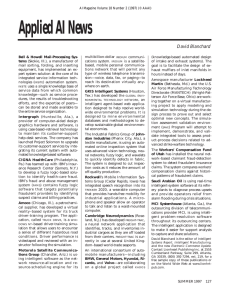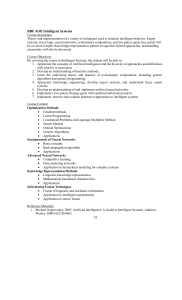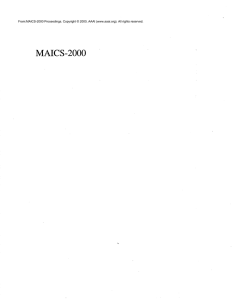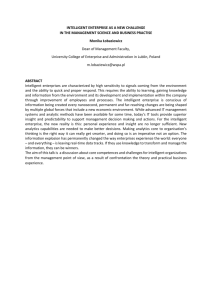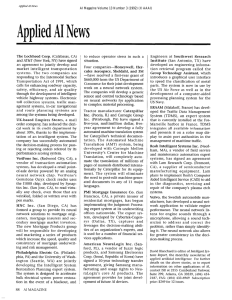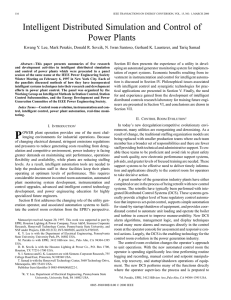Applied AINews L David Blanchard
advertisement
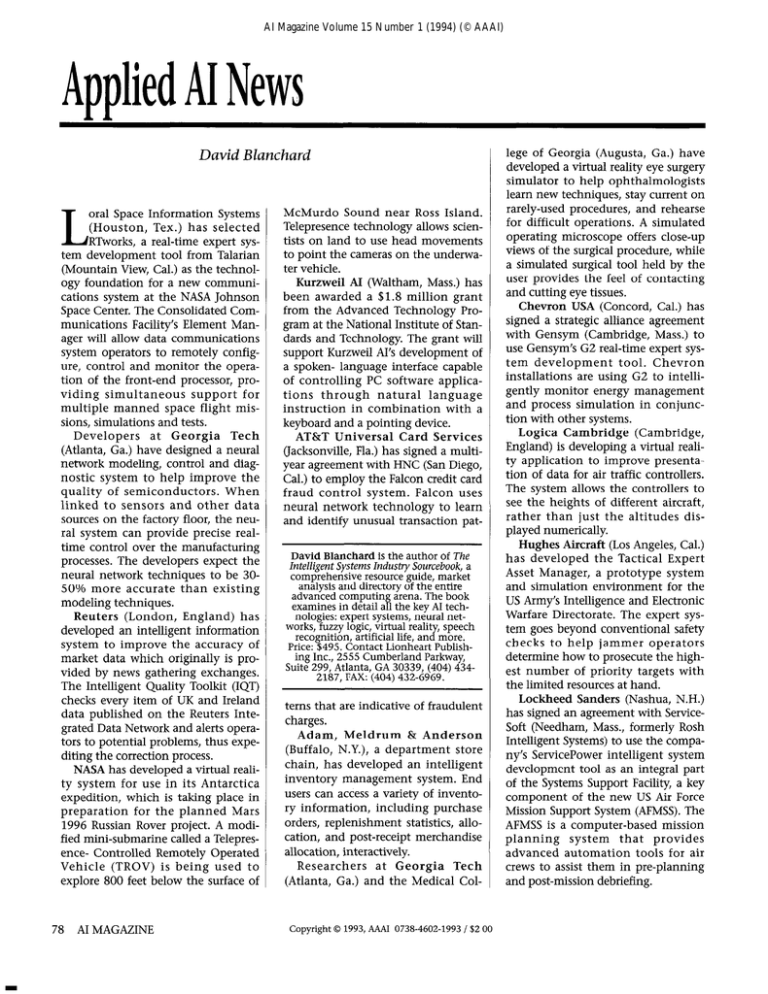
AI Magazine Volume 15 Number 1 (1994) (© AAAI) Applied AINews David Blanchard L oral Space Information Systems (Houston, Tex.) has selected RTworks, a real-time expert system development tool from Talarian (Mountain View, Cal.) as the technology foundation for a new communications system at the NASA Johnson Space Center. The Consolidated Communications Facility’s Element Manager will allow data communications system operators to remotely configure, control and monitor the operation of the front-end processor, providing simultaneous support for multiple manned space flight missions, simulations and tests. Developers at Georgia Tech (Atlanta, Ga.) have designed a neural network modeling, control and diagnostic system to help improve the quality of semiconductors. When linked to sensors and other data sources on the factory floor, the neural system can provide precise realtime control over the manufacturing processes. The developers expect the neural network techniques to be 3050% more accurate than existing modeling techniques. Reuters (London, England) has developed an intelligent information system to improve the accuracy of market data which originally is provided by news gathering exchanges. The Intelligent Quality Toolkit (IQT) checks every item of UK and Ireland data published on the Reuters Integrated Data Network and alerts operators to potential problems, thus expediting the correction process. NASA has developed a virtual reality system for use in its Antarctica expedition, which is taking place in preparation for the planned Mars 1996 Russian Rover project. A modified mini-submarine called a Telepresence- Controlled Remotely Operated Vehicle (TROV) is being used to explore 800 feet below the surface of 78 AI MAGAZINE McMurdo Sound near Ross Island. Telepresence technology allows scientists on land to use head movements to point the cameras on the underwater vehicle. Kurzweil AI (Waltham, Mass.) has been awarded a $1.8 million grant from the Advanced Technology Program at the National Institute of Standards and Technology. The grant will support Kurzweil AI’s development of a spoken- language interface capable of controlling PC software applications through natural language instruction in combination with a keyboard and a pointing device. AT&T Universal Card Services (Jacksonville, Fla.) has signed a multiyear agreement with HNC (San Diego, Cal.) to employ the Falcon credit card fraud control system. Falcon uses neural network technology to learn and identify unusual transaction patDavid Blanchard is the author of The Intelligent SystemsIndustry Sourcebook,a comprehensive resourceguide, market analysis and directory of the entire advanced computin arena.The book examinesin detail aP1the key AI technologies: expert systems,neural networks, fuzzy logic, virtual reali speech recognition, artificial life, anasmore. Price: $495. Contact Lionheart Publishing Inc., 2555 Cumberland Parkway, Suite 299, Atlanta, GA 30339, (404) 4342187, FAX: (404) 432-6969. terns that are indicative of fraudulent charges. Adam, Meldrum ST Anderson (Buffalo, N.Y.), a department store chain, has developed an intelligent inventory management system. End users can access a variety of inventory information, including purchase orders, replenishment statistics, allocation, and post-receipt merchandise allocation, interactively. Researchers at Georgia Tech (Atlanta, Ga.) and the Medical Col- Copyright 0 1993, AAAI 0738-4602-1993 / $2 00 lege of Georgia (Augusta, Ga.) have developed a virtual reality eye surgery simulator to help ophthalmologists learn new techniques, stay current on rarely-used procedures, and rehearse for difficult operations. A simulated operating microscope offers close-up views of the surgical procedure, while a simulated surgical tool held by the user provides the feel of contacting and cutting eye tissues. Chevron USA (Concord, Cal.) has signed a strategic alliance agreement with Gensym (Cambridge, Mass.) to use Gensym’s G2 real-time expert system development tool. Chevron installations are using G2 to intelligently monitor energy management and process simulation in conjunction with other systems. Logica Cambridge (Cambridge, England) is developing a virtual reality application to improve presentation of data for air traffic controllers. The system allows the controllers to see the heights of different aircraft, rather than just the altitudes displayed numerically. Hughes Aircraft (Los Angeles, Cal.) has developed the Tactical Expert Asset Manager, a prototype system and simulation environment for the US Army’s Intelligence and Electronic Warfare Directorate. The expert system goes beyond conventional safety checks to help jammer operators determine how to prosecute the highest number of priority targets with the limited resources at hand. Lockheed Sanders (Nashua, N.H.) has signed an agreement with ServiceSoft (Needham, Mass., formerly Rosh Intelligent Systems) to use the company’s ServicePower intelligent system development tool as an integral part of the Systems Support Facility, a key component of the new US Air Force Mission Support System (AFMSS). The AFMSS is a computer-based mission planning system that provides advanced automation tools for air crews to assist them in pre-planning and post-mission debriefing.
